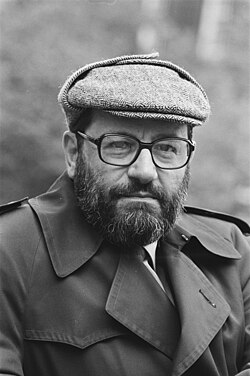Umberto Eco Quote
I gave up trying to establish where progress lay, and where revolution, or to see the plot -- as Amparo's [Brazilian] comrades expressed it -- of capitalism. How could I continue to think like a European once I learned that the hopes of the far left were kept alive by a Nordeste bishop suspected of having harbored Nazi sympathies in his youth but who now faithfully and fearlessly held high the torch of revolt, upsetting the wary Vatican and the barracudas of Wall Street, and joyfully inflaming the atheism of the proletarian mystics won over by the tender yet menacing banner of a Beautiful Lady who, pierced by seven sorrows, gazed down on the sufferings of her people?
I gave up trying to establish where progress lay, and where revolution, or to see the plot -- as Amparo's [Brazilian] comrades expressed it -- of capitalism. How could I continue to think like a European once I learned that the hopes of the far left were kept alive by a Nordeste bishop suspected of having harbored Nazi sympathies in his youth but who now faithfully and fearlessly held high the torch of revolt, upsetting the wary Vatican and the barracudas of Wall Street, and joyfully inflaming the atheism of the proletarian mystics won over by the tender yet menacing banner of a Beautiful Lady who, pierced by seven sorrows, gazed down on the sufferings of her people?
Related Quotes
People accuse me of falling in love easily. It just means that I'm able to see the beauty in most of the people who cross paths with me and I appreciate it for what it is and also for what it isn't. L...
About Umberto Eco
Eco wrote prolifically throughout his life, with his output including children's books, translations from French and English, in addition to a twice-monthly newspaper column "La Bustina di Minerva" (Minerva's Matchbook) in the magazine L'Espresso beginning in 1985, with his last column (a critical appraisal of the Romantic paintings of Francesco Hayez) appearing 27 January 2016. At the time of his death, he was an Emeritus professor at the University of Bologna, where he taught for much of his life. In the 21st century, he has continued to gain recognition for his 1995 essay "Ur-Fascism", where Eco lists fourteen general properties he believes comprise fascist ideologies.
